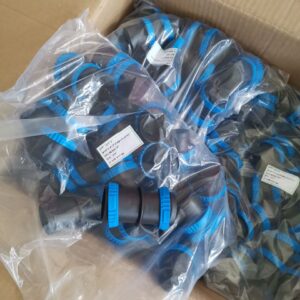Spray tapes contribute significantly to the efficiency and effectiveness of an irrigation system in several ways:
- Uniform Water Distribution: They deliver water evenly across the irrigated area, ensuring consistent coverage and hydration for plants. This uniform distribution prevents overwatering in some areas and underwatering in others, maximizing the effectiveness of irrigation.
- Adjustable Flow and Coverage: Spray tapes often offer adjustable flow rates and spray patterns, allowing users to customize watering according to specific plant needs or field layouts. This adaptability enhances the system’s efficiency by tailoring water delivery to match varying requirements.
- Targeted Watering: They provide targeted water application to specific areas or plants, minimizing water wastage by delivering moisture precisely where it’s needed. This targeted approach reduces runoff and evaporation common in less precise irrigation methods.
- Versatility in Application: Spray tapes can be used in various agricultural or gardening settings, adapting to different soil types, plant types, or field configurations. Their versatility allows for efficient watering in diverse environments.
- Water Conservation: By delivering water directly to the root zone of plants with minimal runoff or evaporation, spray tape spray tapes conserve water resources. Their controlled and precise application reduces overall water usage compared to less efficient irrigation methods.
- Low Energy Consumption: Spray tapes typically operate at lower pressure and energy requirements than traditional sprinkler systems. This low-energy approach enhances the system’s sustainability while effectively irrigating the intended areas.
- Reduced Maintenance: Compared to some other irrigation methods, spray tapes often require less maintenance due to their simplicity and durable construction. This reduces the time and effort needed for upkeep, contributing to the system’s overall efficiency.
- Adaptability to Changing Needs: Spray tapes can be adjusted, relocated, or modified to accommodate changing conditions, such as plant growth or field layouts. This adaptability ensures the system remains efficient and effective over time.
- Consistent Plant Growth: By providing consistent moisture to plants, spray tapes support healthy growth, improving crop yield and quality. This consistency in irrigation contributes to the overall effectiveness of agricultural production.
- Compatibility with Other Systems: They can be integrated with other irrigation methods, such as drip irrigation or soaker hoses, allowing for a hybrid system that maximizes efficiency while catering to specific watering needs.
In summary, spray tapes play a pivotal role in enhancing the efficiency, effectiveness, and sustainability of irrigation systems by providing precise, uniform, and targeted water distribution to plants while conserving water resources and minimizing wastage.
What advancements or innovations have been made in spray tape technology?
In recent years, several advancements and innovations have been made in spray tape technology, aiming to improve efficiency, durability, and versatility. Some notable advancements include:
- Improved Durability: Manufacturers have developed spray tapes using more durable materials resistant to UV degradation, chemicals, and abrasion. This enhances their lifespan and performance in diverse environmental conditions.
- Precision in Water Application: Advancements in nozzle design and technology allow for finer control over water droplet size, distribution, and spray patterns. This precision ensures more efficient and targeted water delivery to plants.
- Pressure Regulation: Some modern spray tapes integrate pressure regulation mechanisms within the tape itself. This feature ensures consistent water pressure along the entire length of the tape, optimizing water distribution and minimizing pressure-related inefficiencies.
- Customizable Flow Rates: Innovative designs allow for adjustable flow rates or configurations within the same tape. This adaptability enables users to tailor watering to varying plant needs or specific sections of the field.
- Hybrid Functionality: Some spray tapes incorporate multiple functionalities, such as combining drip irrigation capabilities with spray features. This hybrid design provides flexibility in addressing different irrigation requirements within the same system.
- Smart Irrigation Technologies: Integration with smart sensors and control systems allows for more precise and automated irrigation. These technologies monitor soil moisture levels, weather forecasts, and plant water requirements to optimize watering schedules and amounts.
- Recycled and Eco-Friendly Materials: Advancements in material science have led to the development of spray tapes using recycled or biodegradable materials, contributing to environmentally sustainable irrigation practices.
- Integrated Filtration Systems: Some modern spray tapes incorporate built-in filtration systems that prevent clogging of nozzles, ensuring uninterrupted water flow and reducing maintenance needs.
- Remote Monitoring and Control: IoT (Internet of Things) technology enables remote monitoring and control of irrigation systems equipped with spray tapes. This allows for real-time adjustments and management of water distribution from a distance.
- Adaptability and Modularity: Advancements in design allow for modularity and adaptability, enabling easy modifications or extensions of the irrigation system without replacing the entire tape setup.
These advancements in spray tape technology aim to address challenges related to water conservation, efficiency, and performance in irrigation systems while providing growers with more customizable and sustainable solutions for their irrigation needs.

